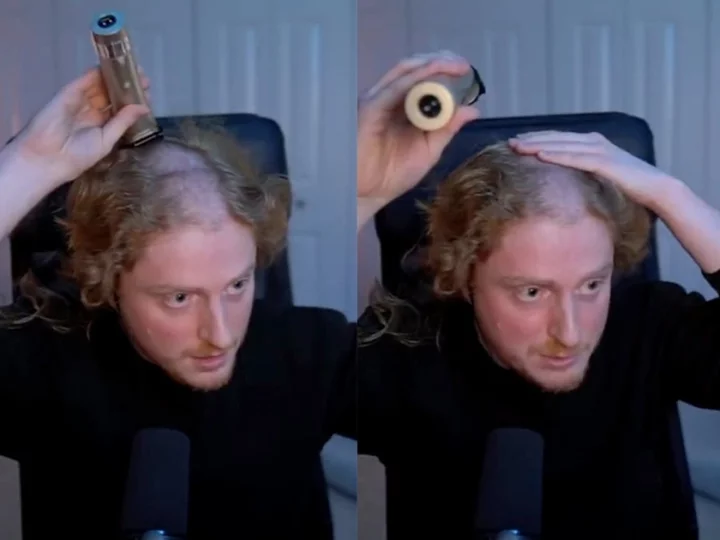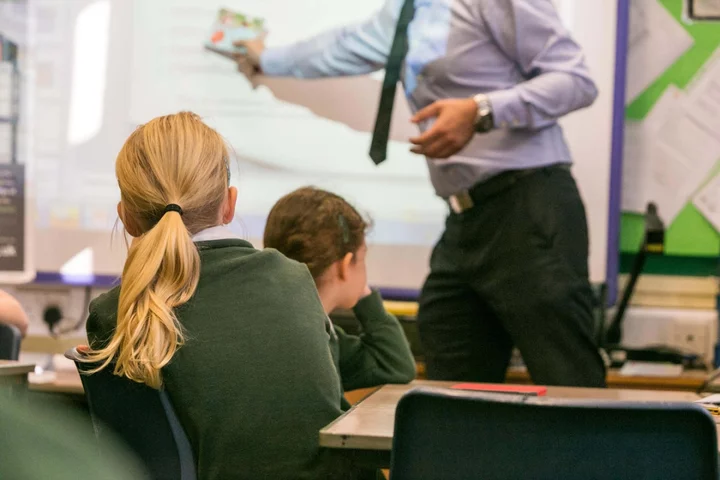
YouTube begins verifying videos by UK doctors to tackle health misinformation
YouTube has launched a verification system for UK-based doctors, nurses, and other healthcare professionals to help Britons dodge medical misinformation online. UK-based users accounted for more than two billion video views of clips on health conditions in 2021. YouTube added a new seal of approval to accounts run by licensed doctors, nurses, psychologists, and other health practitioners or organisations who have passed stringent verification checks to fight misinformation. YouTube head of UK health Dr Vishaal Virani said the move to verified health videos for UK users was crucial due to the number of Brits accessing healthcare information through the video-sharing platform. Dr Virani told the BBC: “Whether we like it or not, whether we want it or not, whether the health industry is pushing for it or not, people are accessing health information online. We all know how difficult it can be to differentiate between healthcare information from trusted and reliable sources and content which is inaccurate or doubtful provenance Professor Dame Helen Stokes-Lampard “We need to do as good a job as possible to bring rigour to the content that they are subsequently consuming when they do start their care journey online.” The verification system began accepting applications from UK-based healthcare professionals to those with an active medical licence in June. Accounts that applied to the verification scheme are now starting to receive their YouTube mark of authenticity on their videos, to make it as easy as possible users to know if the information has come from a qualified healthcare professional. Potential health creators submitting their accounts have to go through a rigorous, multi-stepped verification process that works in partnership with the Academy of Medical Royal Colleges and the NHS. Health creators also have their past videos scrutinised and do not receive verification if previous videos uploaded to YouTube have contained any medical misinformation. Chairwoman of the Academy of Medical Royal Colleges Professor Dame Helen Stokes-Lampard said the partnership with YouTube had resulted in a positive solution for all. Dame Helen said in a statement: “We all know how difficult it can be to differentiate between healthcare information from trusted and reliable sources and content which is inaccurate or doubtful provenance. “I am pleased to say we have been able to draw on our own expertise and that of organisations from across the UK healthcare landscape to produce an easy-to-apply set of principles which will ultimately benefit everyone who turns to YouTube seeking trustworthy health information.” YouTuber and doctor Simi Adedeji has already received her YouTube tick of approval. But Dr Adedeji told the BBC that her videos, which primarily focus on skin health and women’s health, are not to be used in lieu of making an appointment with a medical professional for real-life advice. Dr Adedeji said: “There’s a difference between giving medical education, which is what we’re doing, and giving medical advice, which we don’t do. “It’s about giving medical information so that the audience feels empowered and can then go and see their doctor.” Read More Charity boss speaks out over ‘traumatic’ encounter with royal aide Ukraine war’s heaviest fight rages in east - follow live Should you swap your foundation for a lightweight skin tint? What should you do if you think your child is being bullied at school? What women should do if they experience violence online
2023-09-08 16:15

What women should do if they experience violence online
More than one in 10 women and girls in the UK’s four nations has been a victim of online violence, new research has found. Online violence can includes abuse, unwanted sexual remarks, trolling, threats, and non-consensual sharing of intimate messages and photos. The online YouGov survey, said to be the biggest so far into the issue, found 17% of the women and girls surveyed in Wales and Scotland have experienced online violence, as well as 15% in England and 12% in Northern Ireland. Researchers from the Open University said the findings show the problem is “widespread”. The data came from the 7,500 people aged 16 and over – 4,000 women and girls and 3,5000 men and boys – earlier this year. It also highlighted that online violence was higher among for those aged 16-24 (25%) and for LGBT+ women and girls (35%). The most commonly perceived reasons for why people commit such online violence were the anonymity provided by being online (49%), ease of getting away with it (47%) and misogyny (43%). So what can you do if you’re a victim of online violence? Trolling According to the Crown Prosecution Service, trolling is “a form of baiting online which involves sending abusive and hurtful comments across all social media platforms”. Trolls can be found everywhere on the internet, including forums, blogs, websites and social networks. “Don’t respond,” said Ruth Peters, solicitor and director at criminal defence firm Olliers Solicitors. “Trolls are looking for a reaction. Their aim is to upset and provoke you into making an angry/emotional response. Whilst you can’t prevent a troll from targeting you, you can decide how you choose to react. If you choose not to respond to the abuse, trolls generally give up and go away.” If you are being bullied online or receiving abusive comments, Dr Angela Wilcock, a senior lecturer in criminology at University of Sunderland thinks it’s important to tell a family member or a close friend, so you don’t feel alone and have can their support. The Online Safety Bill (which is expected to be passed at the end of this year) to protect women and girls is key, said Wilcock, “along with education from a young age. Women are continually having to risk assess and protect themselves, but we are not dealing with the perpetrators”. She added: “If women and girls do experience online violence, they must tell someone and seek help immediately from specialist services. To make themselves safer, they can also ensure social media privacy settings are activated.” Don’t forget to record, report and block trolls too. Peters noted. “If someone makes an offensive post, take a screenshot or print the post so that you have proof of it if necessary. “Ask the website moderator, administrator or owner to intervene if the troll doesn’t stop. Most websites/social network platforms have strong anti-abuse policies and, in most cases, trolls are guilty of violating their terms and conditions so will have their accounts terminated. “It’s OK to block those whose behaviour makes you feel uncomfortable and blocking someone on social media is easy.” Threats and abusive communication Set out under the Communications Act 2003 and the Malicious Communications Act 1988, malicious communications can include cyberbullying, harassment online or homophobic, racist, transphobic or misogynistic hate speech. Under section 127 of the Communications Act 2003, it is an offence for someone to send a message that is grossly offensive or indecent, obscene or menacing character. “The message does not need to actually reach the intended victim – the act of sending the message is sufficient,” Peters said. “A ‘message’ will cover all forms of messaging so this can mean a text, email, Facebook message, an internet forum, Snapchat message or picture, etc. Any image or message which has been sent electronically will be covered by this act.” Glitch, a UK charity aiming to end online abuse and championing digital citizenship, with a specific focus on black women and marginalised people, published its 2023 Digital Misogynoir Report in July. The findings “illuminate the ways misogynoir shows up in online spaces; the way it spreads and intersects with other forms of white supremacy; and, most disappointingly, how it is still missed in content moderation by tech platforms”, according to founder and CEO, Seyi Akiwowo, “Tech companies must take responsibility for the ways their ‘build first, think later’ approach actively harms black women – online and offline. “And while the pressure we’ve been applying to the UK government has resulted in the welcome and necessary addition of women and girls to the Online Safety Bill, the government has a responsibility to hold tech companies to consistent account for the violence their platforms enable.” Non-consensual sharing of intimate photos and messages In April 2015, the Criminal Justice and Courts Act (CJCA) 2015 made ‘revenge porn’ a specific offence, and it became a crime to “disclose private sexual photographs and films; without the permission of the individual who appears in the photograph or film; with intent to cause distress”, Peters said. “[But] stronger regulation is also proposed surrounding the sharing of sexual images without consent.” The Online Safety Bill, currently progressing through the House of Lords, seeks to specifially criminalise similar offences to revenge porn. “These include sharing ‘deepfakes’ (explicit images which have been altered to look like someone) without consent,” Peters said. “Stronger regulation is also proposed surrounding the sharing of sexual images without consent. The current law requires intention to cause distress in order to be found guilty of this offence, [but] the proposed changes will amend this in order to prosecute more people.” She added: “There will be a ‘base offence’ for sharing intimate images without consent. There will be two more serious offences created if images are shared to cause humiliation, alarm or distress, or for sexual gratification.” But for Wilcock, “women shouldn’t have to ensure our profiles are closed off to the world just so that we don’t endure abuse from trolls and abusers. “It shouldn’t be this way, but that is the sad reality of today’s online world. Until we do more to hold perpetrators to account and deal with them appropriately, it is hard to see how it will get better for victims.” Read More Charity boss speaks out over ‘traumatic’ encounter with royal aide Ukraine war’s heaviest fight rages in east - follow live Athlete who ran over 200km through the desert shares advice for running in a heatwave Women being invited to help shape the future of reproductive healthcare – from period pain to menopause How to style your home like a professional
2023-09-07 22:27

How to help your teen with comparison culture on GCSE results day
Whether your child’s GCSE results are high, low, or somewhere in between, one thing is inevitable – they’ll compare them with their friends’ grades. This comparison culture, which is far more pervasive because of social media, can leave teens feeling inadequate because their results are worse than their mates, or make their friends feel useless if roles are reversed. But although there’s no getting away from teenagers comparing their results both on and offline, what can parents do to try and limit the damage this it can cause? Former teacher Dr Julia Clements, principal educational psychologist at the children’s mental health charity Place2Be, says the comparison of results will undoubtedly impact some teenagers’ wellbeing. “Your teenager is bound to compare their results with their peers at the same school, but also through social media,” she acknowledges. “Although this comparison is inevitable, it may be harmful for your child’s wellbeing – especially if they’ve not done as well as expected. “Indeed, the term ‘compare and despair’ can be especially pertinent on days like today.” Sharon Davies, CEO of Young Enterprise, a charity which helps young people navigate the changing world of work, adds: “The pressure to measure up to their friends’ achievements can be overwhelming, leading to feelings of inadequacy or disappointment.” So how can parents help their teens? 1. Ask how they feel If your child is down on themselves and rating themselves negatively in comparison to their friends, they may reject any positives and praise parents provide, Clements warns. “It may be more useful, in the first instance, to ask them how they’re feeling, and to acknowledge and validate difficult feelings,” she advises. Such feelings may include disappointment, sadness, anger, shame, or feeling as if they’ve let themselves – and you – down. “If your child is feeling like this, it’s important to give them the message that you love them unconditionally and you’re proud and pleased to be their parent because of who they are – not because of the grades they achieve,” she stresses. 2. If they’ve done better than their friends… If your child has achieved good results, which may be better than some of their friends, then they’ll want to celebrate. But while celebrating is of course a great idea, Clements suggests: “You may want to talk with them about how to be sensitive and compassionate towards their friends who haven’t done so well.” 3. Help them turn a negative into a positive Consultant clinical psychologist Dr Nihara Krause specialises in teenage mental health and is working with the Talking Futures campaign to help parents engage their children in meaningful conversations about their futures. She says if a young person doesn’t get the grades they were hoping for, they may be highly critical of their performance in comparison to their peers. But she suggests parents show them how to turn their negative thinking around. “Parents should encourage their children to focus on recognising the approach they took to exams this time round and take steps to reflect on what they could do to achieve a better result in the future. Focus on what helps a young person gain their own personal best, no matter how their results compare with others.” 4. Don’t ask about their friend’s results or post about them Krause says parents should try to celebrate their child’s achievements for what they are and avoid asking about their friends’ results. “To avoid comparison, parents should also avoid sharing their child’s results on social media,” she says. 5. Don’t be too hard on yourself Clements points out that comparison culture may not just affect teenagers – if their results aren’t as good as expected, mums and dads might start comparing their own parenting during the revision and exam period with other parents whose kids have got better results. “As a parent or carer, you may also be drawn into unhelpful comparisons with others,” says Clements, “and you may question the amount of support you were able to provide your child in the run up to their exams. However, today is not a day for self-criticism or judgements – some self-compassion is important at this time.” 6. Reach out for support This might be the first results day many parents have gone through with their child, and while comparisons with other teens may well have been unhelpful, Davies points out that schools will have career advisers and teachers available who can offer support and advice. There are also online forums and blogs where those in similar situations share their experiences. She says: “No-one is expecting you to have all the answers – that’s why there’s support available.” Read More Charity boss speaks out over ‘traumatic’ encounter with royal aide Ukraine war’s heaviest fight rages in east - follow live Women more severely affected by ME, study claims 4 hacks to get teens off the sofa and get active – as study warns of heart damage Taking adult education classes may lower risk of dementia, study suggests
2023-08-24 13:47

Parents of nine-year-old high school graduate reveal their number one parenting tip
David Balogun is a normal kid who competes in paper airplane races with his younger sister, Eliana and struggles to sit still, but he is also one of the youngest people in the United States to receive a high school diploma. In late January, Balogun graduated from Reach Cyber Charter School, which is a tuition-free online school in Pennsylvania. This month he will be starting classes at Southern New Hampshire University as a full-time student. Balogun and his parents, Ronya and Henry, spoke about what it was, and still is, like raising someone with a high intellect on CNBC Make It. The couple said they first tested their son’s intelligence when he was six years old. After that, they began to rethink any parenting philosophies they previously had. “There’s no book on it,” Ronya said. “You’ve got to develop a different mindset as a parent,” Henry added. “It’s not always easy when your son is asking you questions constantly. You have to keep answering the questions, because you don’t want to say, ‘Just leave me alone.’” Because of David’s unique circumstances, they’ve developed their own number one rule: When a system isn’t built for your child, don’t try to fix your child. Try to fix the system. Ronya said when David was in first grade, a regular classroom wasn’t working anymore, noting that sometimes his peers would listen to him more than the teacher. So they looked into their state’s gifted programs, which also proved to not be rigorous enough for their nine year old. In 2020, his parents enrolled him in Reach which allowed him to individualise his curriculum and take high school level classes. Although that didn’t come without challenges, including multiple calls to The College Board because David’s birthdate was too young to enroll in advanced placement exams. As for deciding on college, Ronya said she had to put her foot down mentioning she didn’t want David in a class filled with 20 year olds. “It’s a different adaptation that we don’t have in the United States of America yet. It’s very scary, you can’t find this,” she said. “Sometimes I can’t fix the system, but there are other unconventional choices and solutions to help lead my son through his journey to fulfill his dreams.” Trust is also a big part in parenting David, his parents said. They mentioned that, when he was learning specific skills like adding and subtracting negative numbers before he was taught, they had to believe he knew how. “I can’t tell him, ‘This is what you know,’ because I’m not in his brain,” Ronya said. “I have to trust him to be partially leading the way.” Although there are some boundaries in this trust, as David came home one day claiming he now knew where babies came from. His mother was able to briefly give him some information on reproductive anatomy before putting the conversation to a stop. “Mind you, at this moment, I’m talking to a six year old,” Ronya said. In terms of what happens to David beyond college, his parents are unsure and are just figuring it out as they go along. “There is no frame of reference,” Ronya said. “So you know how sometimes when there is no path, you start a new path? Yep, that’s what we’re doing.” The Independent has contacted Ronya and Henry for comment. Read More TikToker urges parents to save old clothes for their children after inheriting mother’s wardrobe Mother criticises ‘double standard’ after husband is praised for taking toddlers to grocery store Mother sparks viral debate for ‘shaming’ parent who refused to give her daughter a slice of cake TikToker urges parents to save all their old clothes for children to inherit Gen X mother goes viral for attack on ‘tired’ American Dream Couple discovers why their child thought ‘mums foam at the mouth while having babies’
2023-08-16 05:52

Red flags you might be missing about your child’s online safety
During the wait for improved online safety laws, tens of thousands of grooming crimes have been recorded. The Online Safety Bill, which is meant to become law this autumn, has encountered numerous delays and changes since it become a proposed legislation. As a result, the children’s charity NSPCC has called on MPs and tech giants to support the Bill, especially since 34,000 online grooming crimes had been recorded by UK police forces over the last six years, since first calling for more robust safety regulations in 2017. Based on data from 42 UK police forces, the NSPCC said that last year, 6,350 offences related to the sexual communication with a child were recorded. Some 5,500 took place against primary school-aged children, and 73% of the crimes were related to Meta-linked platforms or Snapchat. NSPCC chief executive Sir Peter Wanless said: “The number of offences must serve as a reminder of why the Online Safety Bill is so important and why the ground-breaking protections it will give children are desperately needed. “We’re pleased the government has listened and strengthened the legislation so companies must tackle how their sites contribute to child sexual abuse in a tough but proportionate way, including in private messaging.” Here are some of the red flags parents should be on the look out for. Being secretive about how they are spending their time On their website, Childline define grooming as someone building a child’s trust to make a connection in order to do something sexual or illegal. “Studies show parental supervision typically declines as children get older, however online abuse does not,” said Mark Bentley, safeguarding and cyber security lead at charity The National Grid for Learning (LGfL). From being secretive to omitting relevant information, changes in behaviour can vary from child to child. But it’s something for all parents to be mindful of when their child starts using social media more. “Unfortunately, as in many areas of child protection, indicators of abuse can often mirror natural markers of growing up,” said Bentley. “As children and adolescents develop, they seek independence from parents, engage in risk taking and have changes in mood and friendship group. “Nonetheless, these markers remain vital to watch out for, even if it is just to support your growing child. Those who are being groomed online are much more likely to be defensive and secretive about phone usage and loathed to be separated from their device.” Having unexplained gifts, big or small Buying gifts for children, whether big or small, can be another grooming technique used to flatter children and their families. “Some groomers have been known to provide alternative phones just to contact them, and this is always a red flag if you suspect your child may have a secondary device,” said Bentley. They are spending too much time onlineSocial media may promote negative experiences if no boundaries have been established.“Of course, some of these [red] flags can also be a sign of the child going through adolescence but it’s important to discuss any unusual behaviour with them as soon as possible,” said Simon Newman, member of International Cyber Expo’s advisory council and of the Cyber Resilience Centre for London.“The way groomers target children varies, but is often done through social media sites, text messages and apps, emails or online forums – particularly gaming sites.”They develop friendships with a much older person Children and young people can be groomed by a stranger or by someone they know – such as a family member, friend or professional, according to NSPCC. But the age gap between a child and their groomer can also be relatively small. The groomer may also work towards building a relationship with the family to gain trust, so they can be left alone with the child. “There are various models of the stages of grooming, but at heart it revolves around building up trust and making a child feel understood and listened to in a way they do not feel elsewhere, and then breaking down the links of trust to family, school, friends and other adults,” said Bentley. “Any parent thinking that this might be happening should definitely reach out for help.” Read More Charity boss speaks out over ‘traumatic’ encounter with royal aide Ukraine war’s heaviest fight rages in east - follow live Rumer Willis says she is ‘grateful’ to her body following birth of daughter Sugary cereals and yoghurts must remove child-friendly packaging – health group Clever kitchen storage solutions to clear the clutter
2023-08-15 22:57

Holiday childcare costs up with fewer places available, survey finds
Fewer than a quarter of local authorities in England have enough holiday childcare provision for parents working full-time and costs have risen across Great Britain since last year, new research has found. Six weeks of summer childcare for each school-age child could cost almost £1,000, according to the Coram Family and Childcare charity’s annual survey. It said families in Great Britain face costs of £943 per child for this holiday period, which is £538 more than they would pay for after-school childcare in six weeks of term time. The research, based on surveys from local authorities in England, Scotland and Wales between April and June, found that the cost of holiday childcare has risen 3% since 2022. A place at a holiday club now costs an average of £157 per week – 2.3 times higher than the cost of an after-school club during term time, the charity said. Wales has the highest weekly price at £168, followed by Scotland at £157 and England at £156. While costs have risen, availability has decreased, according to the charity, with just 24% of local authorities in England saying they have enough holiday childcare for parents working full-time, down 2% on last year. Provision for eight to 11 year-olds has dropped by 7% on last year, with 23% of local authorities saying they have enough for this age group. The high of cost of holiday childcare is going to put a further strain on families’ already stretched budgets Megan Jarvie, Coram Availability of holiday childcare for disabled children in England has also continued to fall, Coram said, with just 5% of local authorities reporting they have enough to meet local demand, down from 7% in 2022. In Scotland, there has also been a drop in the proportion of local authorities reporting sufficient childcare – down 15% for 12 to 14 year olds, down 14% for children living in rural areas, down 12% for parents working full time and down 11% for eight to 11 year olds. No local authorities in Scotland reported having enough holiday childcare in all areas for disabled children, working parents, parents working atypical hours or children in rural areas. While Wales also has low levels of sufficient childcare for disabled children (5%) and 12 to 14 year olds (5%), the proportion of local authorities reporting sufficient childcare in all areas across all categories of holiday childcare, except parents working atypical hours and children in rural areas, has risen. Local authorities in Wales report the highest level of sufficiency of holiday childcare in all areas for parents working full time (18%), followed by four to seven year-olds and eight to 11 year-olds at 14%. Costs and availability of holiday childcare varies depending on where families live, the charity said, stating that parents in inner London pay up to 25% more than those in the East of England – £177 per week compared to £142. In the East Midlands, some holiday childcare places cost 104% more than the national average, while others are 58% less, Coram said. The charity is calling on the Government to extend childcare funding announced in the Spring Statement to include support during school holidays. Megan Jarvie, from Coram, said: “The high of cost of holiday childcare is going to put a further strain on families’ already stretched budgets. Even if families are able to afford these costs, many will struggle to find a place as we have found shortages right across the country. “Starting school doesn’t mean that childcare needs end. Instead, many find that it becomes more challenging to find options that are right for their family, particularly during the long school holidays. “New Government funding to help improve childcare options during term time is welcome – but families need childcare right through the year.” Coram is also calling on those in charge in England, Scotland and Wales to increase support for family information services to provide good quality holiday childcare information and ensure access to local provision that meets families’ needs, expand provision of school holiday activity and food programmes, and improve the accessibility of holiday childcare for children with special educational needs and disability (Send). Rapid price increases in essentials like food, housing and energy bills have left a growing number of the families we work with stretched and barely keeping their finances afloat Jamie Masraff, OnSide chief executive The Local Government Association (LGA) said “concerted investment and recruitment of quality staff” is needed to ensure correct provision for disabled children, and said it was “disappointing” that the Government had not extended childcare support to include summer holidays. Councillor Louise Gittins, chair of the LGA’s children and young people board, said: “While councils recognise the importance of ensuring there is sufficient provision available for children with Send, it can be difficult to ensure the right provision is available, particularly given the challenging situation that many providers face at the moment.” A Department for Education spokesperson said: “Our Holiday Activities and Food (HAF) programme, backed by £200 million per year to 2025, provides healthy meals, enriching activities and free childcare places to children from low-income families over the holidays. “We are also investing £30 million to test new and innovative approaches to short respite breaks for families of children and young people with special educational needs or disabilities.” Youth organisation OnSide called for the HAF scheme to be expanded to working parents, saying it is “increasingly hearing from working families who don’t qualify but are struggling to afford holiday clubs”. Its chief executive, Jamie Masraff, said: “Rapid price increases in essentials like food, housing and energy bills have left a growing number of the families we work with stretched and barely keeping their finances afloat. For too many, there’s simply nothing left to pay for vital summer childcare.” Read More Charity boss speaks out over ‘traumatic’ encounter with royal aide Ukraine war’s heaviest fight rages in east - follow live How to create a kitchen herb garden What is trail running and should we all be doing it? These are the women making waves in the cycling world
2023-07-18 15:47

Gamer finds indent in head from prolonged headset use after shaving his hair
A Twitch streamer was left stunned after he livestreamed himself shaving his hair for charity, only to find an indent on his head from wearing his gaming headset. The gamer, who goes by Curtoss on streaming platform Twitch, went live on 3 June to raise money for the charity organisation, Leukemia & Lymphoma Society. While shaving his head for charity, viewers witnessed Curtoss’s shock when he discovered that his head shape had completely changed due to his prolonged headset use. “The shaver’s working like a champ,” Curtoss said, as he began shaving his hair down the middle of his head. Within seconds, he noticed an indent across the top of his head. “Dude, I have an indent like right here, this is where my headphones go!” he told viewers. “I have a f***ing headphone indent on my head! What the f***?” “I always thought that was just my hair,” he added. It didn’t take long for Curtoss’s reaction to go viral on social media. He shared a clip of his mid-shave discovery to his TikTok, while on Twitter, a video of his head indent received more than 42 million views. Surprisingly, Curtoss wasn’t the only one to find an indent on their head from wearing headphones. “Welcome to the club,” replied one Twitter user, who shared photos of two gamers with indents on their skulls. “We all got one of those at one point or another,” another gamer joked. “Tell me why I’ve just rubbed my head to make sure I don’t have one,” shared one person, while another wrote: “New fear just unlocked” “This is why I will never wear a headset for prolonged time periods,” said someone else. So, can prolonged headphones really cause permanent damage? Yes and no. While there are risks to wearing headphones for long periods of time, head indents are temporary. In fact, Headphonesty reports that it takes at least 135 kg to cause a minor fracture to the skull. However, streamers can get “headphone hair” from wearing a headphone headband for too long, wherein the headset puts too much pressure on the head and flattens the hair. But much like indents on the scalp, hair should gradually return to its original shape in just a few minutes. In order to help get rid of headphone dents on the scalp or hair faster, gamers can gently massage the dent and the surrounding area. A hot shower might help return the head to its original shape, but taking breaks from wearing headphones is the most effective way to avoid causing a dent in the scalp. @curtoss please don't call it "Brain Valley" ?♂️ #twitch #livestreamfails #gamer ♬ original sound - nintendo loser While gamers and Twitch streamers don’t need to worry about changing the shape of their head, prolonged headphone use can lead to permanent hearing loss. The World Health Organization (WHO) estimates that around 50 per cent of people ages 12 to 35 are at risk of hearing loss due to prolonged and excessive exposure to loud sounds, including through headphones. According to the American Osteopathic Association, many headphones and MP3 players today can produce sounds up to 120 decibels, which is equivalent to a sound level at a rock concert. At 120 decibels, hearing loss can occur after only about an hour and 15 minutes. Experts suggest that people should exceed no more than 60 per cent of maximum volume when using headphones. The Independent has contacted Curtoss for comment. Read More Ukrainian schoolboy to buy home for his mother after selling Minecraft server Male characters in video games have 50 per cent more dialogue than female counterparts What is Discord, the chatting app tied to classified leaks? Mother sparks debate over parent who wouldn’t give her daughter a slice of cake How to protect pets from wildfire smoke amid air quality alert ‘Fearful’ Shannen Doherty reveals her cancer has spread to her brain
2023-06-08 06:48

Nearly a third of primary schools have no male classroom teachers – study
Nearly one in three primary schools in England do not have a male classroom teacher, a study suggests. The proportion of secondary school teachers who are male remains at a record low (35%), according to a Warwick Business School report. Researchers said boys from poorer backgrounds would benefit from having a male teacher in school but they are less likely to have one. Raising teachers’ pay, reducing working hours and improving school leadership could help boost recruitment and retention, the report said. Worryingly, the decline in the number of male classroom teachers is getting worse Dr Joshua Fullard, Warwick Business School The study analysed the latest data from the annual School Workforce Census to identify trends in gender diversity among teachers in state schools in England since 2010. It found that nearly a quarter (24.3%) of all state schools in England have no male classroom teachers. In two local authorities, Rutland in the East Midlands and Northumberland in the North East, at least half of the primary schools do not have a male classroom teacher. The study found that more than two in five (41.9%) of the primary schools placed in special measures by Ofsted had no male classroom teachers. The report said: “This could be due to selection – male teachers are in relatively high demand and therefore might be less likely to sort into the lowest achieving school. “Alternately, having no gender diversity in the classroom might negatively impact the functioning of a school.” It’s important for all children and young people to experience a diverse range of positive role models James Bowen, NAHT Dr Joshua Fullard, assistant professor of behavioural science at Warwick Business School, said: “Worryingly, the decline in the number of male classroom teachers is getting worse. “This has an impact on the education that children receive. There is a large body of research that shows students benefit from being educated by a teacher with certain similarities to them. “Boys from less affluent backgrounds are already the lowest achievers in school. They are the students who would benefit most from a male teacher, but they are less and less likely to have one. “It’s not just boys who are losing out. Having no gender diversity could negatively affect how a school functions, as schools in special measures are less like to have a male classroom teacher.” The report called for teachers’ pay to be raised by more than 10% and for a merit-based reduction in tuition fees for university-led teacher training to be introduced. Dr Fullard said: “Men are more likely to consider finances when deciding to go into, or leave, a profession. This explains why the persistent decline in teachers’ pay has affected male teacher numbers more than their female counterparts.” Since 2010, there has been an increase of over 7,000 male teachers in state-funded nursery and primary schools Department for Education James Bowen, assistant general secretary at school leaders’ union the NAHT, said: “It’s important for all children and young people to experience a diverse range of positive role models. “The impact of a diverse school workforce, at all levels in education, is well recognised, including by the Department for Education. “It can help children and young people, especially those from deprived backgrounds, to visualise positive futures and fulfil their potential.” Julie McCulloch, director of policy at the Association of School and College Leaders (ASCL), said: “Having a diverse workforce is a huge asset to a school, but currently many are struggling simply to put a teacher at the front of every classroom. “A great deal of work needs to be done to make teaching a more attractive career to men and women alike. This includes reversing the real terms pay cuts that teachers have experienced since 2010, reducing unmanageable workloads and ensuring all schools are properly funded. “Until these issues are addressed then the profession will continue to lose men and women, whether they are new graduates or experienced teachers, to jobs that are offering more competitive pay and better conditions of service.” A Department for Education spokesperson said: “We want teaching to be an inclusive profession, with equal opportunity for all, regardless of gender, to develop and progress in their careers. “Since 2010, there has been an increase of over 7,000 male teachers in state-funded nursery and primary schools. “We want to continue bringing great people into teaching and have introduced bursaries worth up to £27,000 tax-free and scholarships worth up to £29,000 tax-free, to attract talented trainees in subjects such as mathematics, physics, chemistry and computing.”
2023-06-07 15:17
